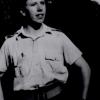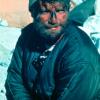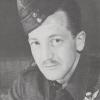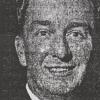EULOGY TO GENERAL SIR ANTHONY FARRAR HOCKLEY
By Lt General Sir Hew Pike, delivered at the Royal Miliary Academy Sandhurst
There is a story told of TFH as the President of the MCC - President of the Moulsford Cricket Club, that is…
-walking to the wicket with the Captain of the village side, to toss up before their annual fixture against the President’s XI. The Captain of the Village IX calls correctly and elects to bat first. “Well”, says the President “I rather thought that we might bat first”. And bat first they did.
“No wonder the Chinese gave up on him”, was the Moulsford Captain’s rueful comment.
All of us remember General Tony in different ways.
Linda remembers him as a deeply loved and loving husband, who with her always provided such a warm welcome for family and friends at Pye Barn.
Dair and Hilary remember him as a devoted Father, who with their beloved Mother, Pat, raised the boys to manhood.
Ted and Pam, remember him as a close brother.
Vicki and Kim as an admired and admiring Father in Law.
Piers, Charlotte, Henry, Damien and Callum remember him as an affectionate, supportive Grandfather, much involved with their interests and ambitions,
And Sergeant Ted Olive, remembers him as his loyal Boss and close friend over more than four decades.
The rest of us, his friends and colleagues in many fields, and his former military comrades,
We all remember the soldier-
the Christian soldier and leader,
the soldier of exemplary moral and physical courage,
the soldier of indefatigable endurance and resilience,
the soldier of irrepressible, contagious confidence and authority- in whose company, failure seemed unthinkable, success somehow assured,
and we all remember the man, too –
the man of deep and penetrating intellect, at home in the world of ideas, and of scholarship.
the man of rigorous conviction, and unremitting standards,
the man of generous spirit, warmth, and humour - whose reflective, knowing smile would lighten the atmosphere of even the most serious discussion.
THE CHRISTIAN SOLDIER AND LEADER
During the War, Farrar-Hockley’s soldiers in 6 PARA, fighting in Italy and Greece, called their 20 year old Company Commander “the boy wonder”, young but trusted.
TFH’s stature as a Christian soldier is really founded, however, on his extraordinary leadership as the 27 year old Adjutant of the Glosters in Korea, where his steadfastness, strong religious faith and unfailing sense of humour gave heart to so many under the most testing of conditions. “The Edge of the Sword”, his remarkable testimony to what he and others endured, is an especially compelling story through his characteristic tendency to understatement. So that his behaviour really does stand timelessly, as witness to how a man of principle and of character should conduct himself under the most exacting of circumstances, “welding those around him into an indomitable team”, as his citation put it.
Standing timelessly too, is the example shown by Colonel Fred Carne, himself a quiet tower of strength and courage, still commanding standards though separated from his soldiers through captivity, and by the spiritual leadership of the Reverend Sam Davies. Sometimes in an adjacent cell to the younger Farrar-Hockley when both men were in solitary confinement, they quietly encouraged each other with humour and companionship through a small hole in the dividing wall. “Tony being Tony,” recalls Sam Davies “made numerous valiant attempts to escape, despite the near impossibility of success in such a hostile environment.” And it was the young Adjutant who reminded Sam that his Bible, which the Chinese had destroyed, was only a book; his faith they could not destroy. Still in his formative years, what Captain Farrar Hockley seems to have learned from such men, he then devoted his life to passing on, to soldier and civilian, to young and old, through his own insistent standards as a Christian leader.
The Christian leader who reflected that helping to get food through to the starving people of Thebes in 1944 was one of the best things he ever did.
MORAL AND PHYSICAL COURAGE
There is no denying the physical courage of the man who won his MC fighting Communist guerillas in Athens, whose impact on the desperate position of A Company I GLOSTERS on Hill 235 was immediate and sustained, and who was in the van of his Battalion as we penetrated deep into the inhospitable mountains of the Radfan. Later gently rebuking his Intelligence Officer, for suggesting that they had been “shot down” together in his Scout helicopter, with enemy fire penetrating the cabin from below.
“Not shot down... forced to land, old chap, forced to land”
Moral courage was his, too.
“Gradually, very painfully,” he writes in the Edge of the Sword, “ I accustomed myself to the idea that I should have to give myself up…and go through the whole business of escaping again”
Why? To return the missing clothes of his companion, Duncan, who had been recaptured and would otherwise have perished in the cold.
And in more recent times, the early 70s, came another stern test of moral courage. As Commander Land Forces in Northern Ireland, he would not compromise with his political masters in his assessment of the growing threat posed by Republican terrorism.
Later on, in his broadcasting, it was this same moral imperative that drove him always to confront the truth, regardless of the fashionable view, regardless of what others might think or wish to hear. No wonder the media were so attracted by his forthright style and skill in debate.
CONFIDENCE AND AUTHORITY
TFH's sheer confidence and authority were formidable. I doubt that anyone here ever witnessed him ruffled, let alone rattled . In his mind, there always had to be a way to resolve difficulties -a way forward. His calm, phlegmatic temperament did indeed seem to “rise superior to every misfortune”, in Gibbon’s memorable phrase, “and derive resources from adversity”. He had the power, through his presence, to command confidence whilst communicating energy.
His addresses to his Battalion- discursive and without a note, were always memorable, often spellbinding. Ranging across the bigger picture one minute, plunging into the minutiae of soldiering the next. His masterly oration to us all when we emerged from the mountains of the Radfan, for example, dwelt on the broad significance of the Battalion’s task, it is true, but did not omit the professional details either - the use of fighting porters for want of helicopters, even the improvised use of tinned compo margerine by the Machine Gun Platoon when the rifle oil ran out. Resourceful soldiering par excellence, he reminded us.
He certainly dominated any situation of which he was part, and would take command at the drop of a hat. For the Battalion’s Annual Fitness for Role Inspection by the Brigadier in Bahrain, he seemed to have decided, not the Brigadier, on a particularly complicated Drill Parade as an appropriate demonstration of our prowess. He did love his drill.
He loved, too, to teach himself new skills, whether ocean sailing, DIY or cooking. His pastry was a speciality, and I guess that not many CO s have had the temerity to demonstrate cooking skills to their Regimental Wives Club. But he would do so, describing Pat as a “good plain cook”, whilst sometimes almost asphyxiating his audience with the Hexamine field cooking tablets that he insisted on using.
Sergeant Olive doubtless has many memories of their DIY adventures together, not least the staircase they built at Pye Barn that wouldn’t quite meet in the middle?
Yes, he would always take command .And in later years, as Colonel and Colonel Commandant of his Regiments, he could have a near paralysing effect on unsuspecting Mayors.
RIGOROUS CONVICTION AND INTELLECT
There are many stories illustrating TFH's conviction, and clarity of mind . In Parachute Regiment circles, one of the favourites dates back to the time when Roly Gibbs, FM to be, was commanding 3 PARA and TFH was his Second in Command. Quite a team! After addresses by the Commanding Officer to the Battalion, Roly would saunter off, leaving the field to the Second in Command, who would begin by pronouncing that “What the Commanding Officer really meant was…”. And many of us will have been in discussion with him, only to be told, “I know what you are trying to say, old chap", a favourite form of address, "but what you really mean is…”.
His Padres could expect kindly yet characteristically frank critiques of their performance in the pulpit, from a man with a fine singing voice and a seemingly near perfect memory for Hymns Ancient and Modern. One newly joined Padre to the Parachute Brigade recalls being taken into his office and given a talk of which any Bishop would have been proud.
TFHs memory was indeed encyclopaedic and highly reliable, his advice nearly always wise and right. His lucid command of language and idiom made him powerfully persuasive in debate, and much sought after as a lecturer, his style of relaxed authority belieing his meticulous preparation. As an author, and a Vice President of the Western Front Association, he made a major contribution to the historiography of the Great War, his books combining thorough research with a soldier’s understanding of the problems faced at senior command and front line levels alike.
He was a strong influence on the young John Keegan here at Sandhurst, revealing to him that what happens in war is often not told in books. It is instructive that both the Gough and Hamilton families entrusted him with the responsibility for biography and the editing of family papers. His last great written endeavour, the two volume Official History of the Korean War, also won high praise for the rigour and colour of its scholarship.
That he found time to pursue his vocation as a historian in parallel to that as a soldier is itself testimony to his remarkable gifts, seemingly inexhaustible energy and disciplined use of time.
HUMOUR AND GENEROSITY OF SPIRIT
To a subordinate, his humour and generosity of spirit were always a source of relief, often of gratitude too. He was always interested in others, and consistently supported those who served him well, his loyalty often surfacing at critical moments in life, whether personal or professional, when TFH would appear on some pretext or other, for a fatherly walk in the woods, during which the real object of the conversation might only emerge towards its conclusion.
He loved his soldiers, too, guarding their welfare assiduously, which they understood and appreciated. He was also quite a supporter of the “lame duck”- I was always a little surprised at his patience with easily the worst soldier in my platoon, whom he nicknamed “loopy” but for whom he seemed to have quite a soft spot. He gave people a chance, and all merited that chance. For he valued all men by the same criteria:
“If you can talk with crowds and keep your virtue,
Or walk with Kings, nor lose the common touch”.
SUMMARY
It has been said that “Leadership is not imposed, like authority. It is actually welcomed and wanted by the led”.
Throughout his life, TFH's leadership was welcomed and wanted by the many and varied people and organisations whose lives he touched.
And so today, we come together, family, friends, colleagues and comrades in arms, to tell him, before God, how much we too have all welcomed his leadership and his example.
“Serve to Lead”, a slim red anthology of military wisdom that is issued to every Officer Cadet here, has as its tailpiece the “short” version, the essence of all its messages, which is taken from a broadcast given by FM Slim:
“Unselfishness” he says, “means simply this. You will put first the honour and interests of your country and your Regiment. Next, you will put the safety, wellbeing and comfort of your men. And last -last all the time -you will put your own interests, your own safety, your own comfort.”
All of us do indeed remember General Tony in different ways,
But this we have in common, on this we are of one mind.
That we salute today a matchless exponent of Slim’s great exhortation.
Onward, Christian Soldier.
Courtesy of Maj Gen Dair Farrar-Hockley
Source: Lt Gen Sir Hew Pike, courtesy of Maj Gen Dair Farrar-Hockley
Read More




Latest Comments
There are currently no comments for this content.
Add Comment
In order to add comments you must be registered with ParaData.
If you are currently a ParaData member please login.
If you are not currently a ParaData member but wish to get involved please register.